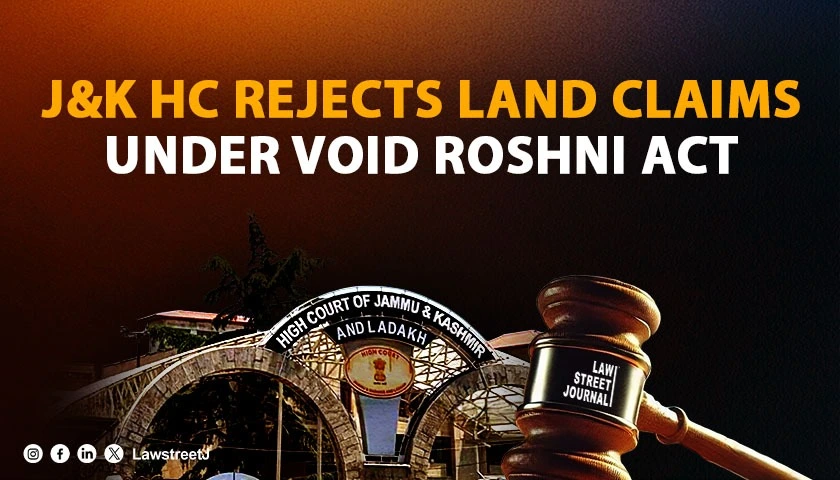Jammu: The High Court of Jammu & Kashmir and Ladakh at Srinagar has dismissed a batch of intra-court appeals filed in Ghulam Rasool Mistri v. State of J&K & Ors., upholding the earlier rejection of claims relating to the alleged vesting of ownership rights under the Jammu and Kashmir State Lands (Vesting of Ownership to Occupants) Act, 2001—commonly known as the Roshni Act. The Court held that the claims were hit by delay and laches, had long attained finality, and stood legally extinguished following the declaration of the Roshni Act as unconstitutional.
The Division Bench of Hon’ble Mrs. Justice Sindhu Sharma and Hon’ble Mr. Justice Shahzad Azeem, in its judgment, noted that the appellants had asserted ownership entitlement on the basis of relinquishment deeds and long-standing possession of parcels of State land. They had also attempted to draw parity with other landholders, including Zainab Begum, Mirza Maqsood Ali, and Adnan Manzoor Ahangar. The Court held that such assertions could not be entertained in view of binding precedent and the constitutional invalidation of the statute forming the basis of their claim.
The Bench referred to the decision in Prof. S.K. Bhalla v. State of J&K & Ors., 2020 (5) JKJ 39 [HC], wherein the Roshni Act was declared “unconstitutional, contrary to law,” and all acts done under it were held “void ab initio.” Applying this precedent, the Court observed that “after the statute under which the appellants have been claiming their right of vesting of ownership in respect of the land in question is declared unconstitutional and void ab initio, the appellants’ claim extinguishes from its inception.” The Bench held that no benefit, parity, or protection could be claimed under a statute that had ceased to exist constitutionally.
The Court rejected the appellants’ plea for parity with individuals who had allegedly secured ownership rights, noting that the principle of positive equality cannot be invoked to perpetuate an illegality. The judgment records that “if any illegality or irregularity has been committed by any forum, others cannot invoke the jurisdiction of the Court for multiplying the same illegality or irregularity.”
The Court also noted the long lapse of time between the completion of acquisition proceedings and the present challenge. The petitioners had not raised objections at the time of the notifications or award, nor pursued statutory remedies available to them. The Bench reiterated the legal position that challenges to land acquisition cannot be entertained after unreasonable delay, observing that “a writ petition cannot be permitted to assail actions which have long since attained finality and on which third-party rights now stand settled.”
The Bench further observed that it was unnecessary to examine all factual assertions advanced at the Bar, since even on the appellants’ own version, no relief could be granted in law. The judgment notes: “Even accepting the appeals and arguments advanced at the Bar, the core issue stands extinguished by operation of law.”
Summarising the legal consequences flowing from the invalidation of the statute, the Bench held that “the sole legal foundation for every asserted right of ownership rests on the benevolence of the Roshni Act… once the foundation crumbled into constitutional nullity, the claimants could not derive even an iota of benefit from a void ab initio statute.” The Court therefore concluded that the appeals lacked merit both in law and equity, and accordingly dismissed them.
Case Title: Ghulam Rasool Mistri v. State of Jammu & Kashmir & Ors.
Court: High Court of Jammu & Kashmir and Ladakh at Srinagar
Bench: Hon’ble Mrs. Justice Sindhu Sharma and Hon’ble Mr. Justice Shahzad Azeem
Date of Judgment: 11 November 2025
Case Numbers: LPAOW Nos. 68/2018, 116/2018, 118/2018
For the Petitioners: Mr. Syed Mohtasim, Advocate; Saqib Fayaz Khan, Advocate (vice Mr. Syed Manzoor, Advocate)
For the Respondents: Mr. Bikramandeep Singh, Deputy A.G. for R-1 to R-7; Mr. M.Y. Bhat, Senior Advocate with Mr. Hamja Prince, Advocate for R-8 & R-9



![J&K and Ladakh HC upholds preventive detention, confirms validity beyond criminal proceedings [Read Order]](/secure/uploads/2024/09/lj_7116_WhatsApp_Image_2024-09-11_at_11.36.56_AM.webp)
![High Court of J&K and Ladakh clarifies dress code rules for Advocates, dismisses domestic violence petition [Read Order]](/secure/uploads/2024/12/lj_1748_Women_lawyers_cant_appear_before_court_with_face_covered.jpg)
![Jammu & Kashmir High Court limits scope of Judicial Review in Tender disputes [Read Judgment]](/secure/uploads/2025/01/lj_8309_0f418c46-349d-4866-907b-bcd34c9236a3.jpg)
![Jammu & Kashmir and Ladakh High Court rules Section 27 statements insufficient to prove knowledge in NDPS cases [Read Order]](/secure/uploads/2025/02/lj_9406_Jammu_&_Kashmir_and_Ladakh.webp)




